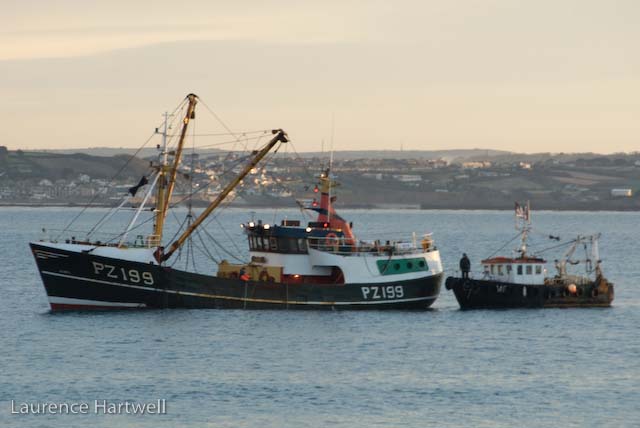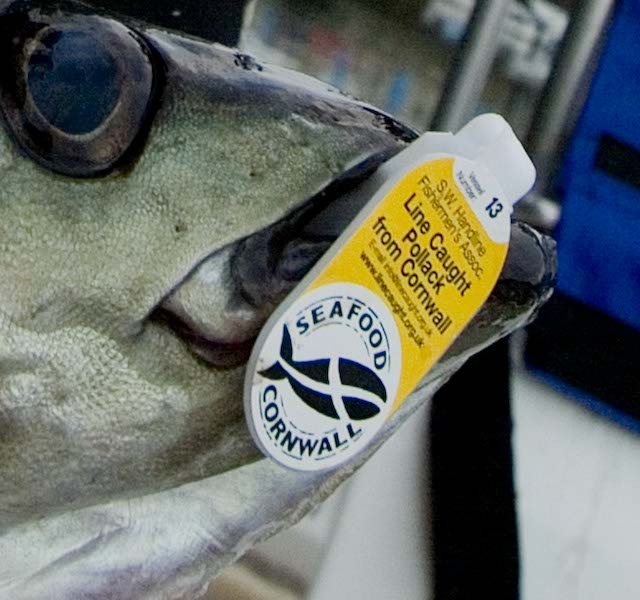Welcome to Through the Gaps, the UK fishing industry's most comprehensive information and image resource. Newlyn is England's largest fish market and where over 50 species are regularly landed from handline, trawl, net, ring net and pot vessels including #MSC Certified #Hake, #Cornish Sardine, handlined bass, pollack and mackerel. Art work, graphics and digital fishing industry images available from stock or on commission.
Wednesday 30 May 2012
Out and back - Algrie's trip after long refit cut short
Penlee lifeboat, Ivan Ellen went to the aid of the beam trawler Algrie after she broke down 7 miles south of Newlyn on what was effectively her maiden voyage after a long refit.
BBC criticised for CFP ‘distortion’
THE NFFO feels aggrieved by the media coverage of the forthcoming CFP reform and contends that even the BBC have been taking an approach that undermines their reputation for impartiality. (The recent BBC story covering the eating of red meat report from the US was a recent case of poor reporting as subsequent stories revealed)
According to the federation, the broadcaster: “has succumbed to a facile heroes and villains script which pits a crusading European Commission, aided by selfless environmentalists, against an unholy alliance of a rapacious fishing industry, supported by complicit or spineless ministers from those member states with fishing interests. The Commission’s proposals, according to this script, represent the pinnacle of environmental virtue.
Anyone opposing the Commission’s drive towards mandatory obligation for all stocks to be fished at MSY, a ban on discards or tradable fishing quotas is either, craven, tainted, or wrongheaded.” The truth, the federation continues, lies elsewhere. Maximum sustainable yield may be a noble political aspiration but all fisheries scientists know that it is a flawed and limited concept when applied to the complex realities of multi-species fisheries.
Fisheries managers would be foolish indeed to tie their hands to biomass levels that may be affected by many other factors than fishing. That is why the two simple but critically important words “where possible” were included in the Johannesburg agreement and should be retained now. A system of mandatory EU transferable fishing concessions will be rejected by member states because it is exactly this type of inflexible top-down command and control approach to managing fisheries that lies at the heart of the CFP’s underperformance over the last 20 years. In any event, the evidence is far from convincing that transferable quotas lead, on their own, to fleet reductions.
The most obvious European examples of TFCs have been preceded or accompanied by large scale vessel scrapping schemes using public money so it is difficult to see what caused what. And calls for a discard ban that ignore the different reasons for discards including the EU’s own fisheries regulations, and therefore the need for a range of different solutions, amount to so much saloon bar bluster. Real progress has been made in reducing discards and the focus should be on maintaining this momentum rather an approach that is 98% PR gesture.
The story that you are not likely to read or hear about in the media is that, despite the hostile press, fishermen are working on a daily basis with fisheries scientists and fisheries managers, within a seriously dysfunctional system, to improve fishing gear and fishing systems.
(Plenty of examples have been reported on Through the Gaps re the work of Cefas etc)
Neither are you likely to hear about the huge progress that has been made over that past 10 years to rebuild depleted stocks, or that many stocks are at or close to their maximum yield. It is possible to turn the simplistic pantomime villain theme on its head by observing that the CFP's calamitous record on resource policies, until the very recent past, has been intimately tied in to the Commission's unswerving commitment to a top-down command and control approach, which is continued in these three aspects of the reform package. And, whilst the fishing industry is well experienced in working collaboratively with environmental NGOs in the RACs, the interventions of the Pew Foundation, an organisation brought into existence in the 1930s to oppose Roosevelt's New Deal and export American values, has been to cheer on this failed approach.
Story courtesy of FishNewsEU.
According to the federation, the broadcaster: “has succumbed to a facile heroes and villains script which pits a crusading European Commission, aided by selfless environmentalists, against an unholy alliance of a rapacious fishing industry, supported by complicit or spineless ministers from those member states with fishing interests. The Commission’s proposals, according to this script, represent the pinnacle of environmental virtue.
Anyone opposing the Commission’s drive towards mandatory obligation for all stocks to be fished at MSY, a ban on discards or tradable fishing quotas is either, craven, tainted, or wrongheaded.” The truth, the federation continues, lies elsewhere. Maximum sustainable yield may be a noble political aspiration but all fisheries scientists know that it is a flawed and limited concept when applied to the complex realities of multi-species fisheries.
Fisheries managers would be foolish indeed to tie their hands to biomass levels that may be affected by many other factors than fishing. That is why the two simple but critically important words “where possible” were included in the Johannesburg agreement and should be retained now. A system of mandatory EU transferable fishing concessions will be rejected by member states because it is exactly this type of inflexible top-down command and control approach to managing fisheries that lies at the heart of the CFP’s underperformance over the last 20 years. In any event, the evidence is far from convincing that transferable quotas lead, on their own, to fleet reductions.
The most obvious European examples of TFCs have been preceded or accompanied by large scale vessel scrapping schemes using public money so it is difficult to see what caused what. And calls for a discard ban that ignore the different reasons for discards including the EU’s own fisheries regulations, and therefore the need for a range of different solutions, amount to so much saloon bar bluster. Real progress has been made in reducing discards and the focus should be on maintaining this momentum rather an approach that is 98% PR gesture.
The story that you are not likely to read or hear about in the media is that, despite the hostile press, fishermen are working on a daily basis with fisheries scientists and fisheries managers, within a seriously dysfunctional system, to improve fishing gear and fishing systems.
(Plenty of examples have been reported on Through the Gaps re the work of Cefas etc)
Neither are you likely to hear about the huge progress that has been made over that past 10 years to rebuild depleted stocks, or that many stocks are at or close to their maximum yield. It is possible to turn the simplistic pantomime villain theme on its head by observing that the CFP's calamitous record on resource policies, until the very recent past, has been intimately tied in to the Commission's unswerving commitment to a top-down command and control approach, which is continued in these three aspects of the reform package. And, whilst the fishing industry is well experienced in working collaboratively with environmental NGOs in the RACs, the interventions of the Pew Foundation, an organisation brought into existence in the 1930s to oppose Roosevelt's New Deal and export American values, has been to cheer on this failed approach.
Story courtesy of FishNewsEU.
Jubileeation? Fish market shuts for long weekend
The market won't look like this until the 6th June - next Wednesday - as it will be closed for the extended Bank Holiday period this weekend - get your fish orders in early!
Cheeky monks
A good sign, a deserted fish grader.......
the auction in full swing......
selling soles now graded to perfection........
next stage is to get some printed tallies like what they 'av at Brixham Baz......
bet these little beauties are for sale across the road at P&J Tonkin's later today......
cod don't get any more golden than these......
or blacker fish than these......
sweet monk cheeks, stars of Paul Ainsworth's Great British Menu's fish dish last night with his gladiatorial take on monk.....
and a big solid monk tail - gadzooks, zounds! - sacrilege Yan, I know......
Floyd favourites, cracking red gurnards that not so long ago would have been sweating in tubs down the quay on the deck of a local crabber - they can't afford them for bait any more......
it's hake promotion time with a mid-tide shot of fish from the netter Ajax......
one punt heads out Through the Gaps.......
a few weeks off for the crystal Sea II for a paint up and overhaul......
neat little wooden sail boat en passant......
the old raft has finally relinquished its grip on the waters of the harbour.......
two different hulls from two different eras.......
Lionel, a man on a mission.
the auction in full swing......
selling soles now graded to perfection........
next stage is to get some printed tallies like what they 'av at Brixham Baz......
bet these little beauties are for sale across the road at P&J Tonkin's later today......
cod don't get any more golden than these......
or blacker fish than these......
sweet monk cheeks, stars of Paul Ainsworth's Great British Menu's fish dish last night with his gladiatorial take on monk.....
and a big solid monk tail - gadzooks, zounds! - sacrilege Yan, I know......
Floyd favourites, cracking red gurnards that not so long ago would have been sweating in tubs down the quay on the deck of a local crabber - they can't afford them for bait any more......
it's hake promotion time with a mid-tide shot of fish from the netter Ajax......
one punt heads out Through the Gaps.......
a few weeks off for the crystal Sea II for a paint up and overhaul......
neat little wooden sail boat en passant......
the old raft has finally relinquished its grip on the waters of the harbour.......
two different hulls from two different eras.......
Lionel, a man on a mission.
Mourning Saturday morning memorable Mission moments.
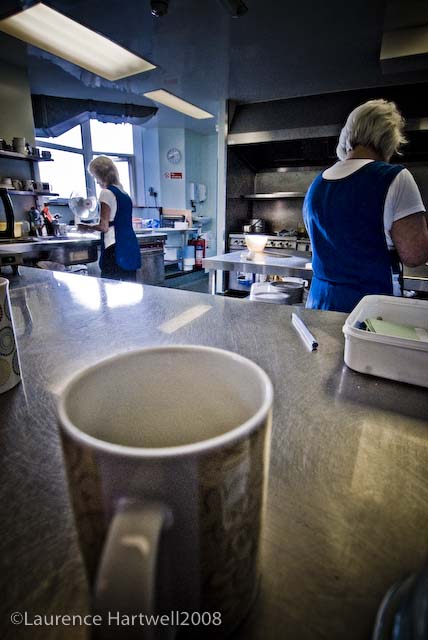 |
| No more cheerful Saturday morning cha and chat with the girls.... |
Here's the disastrous news from the Mission skipper in Newlyn......
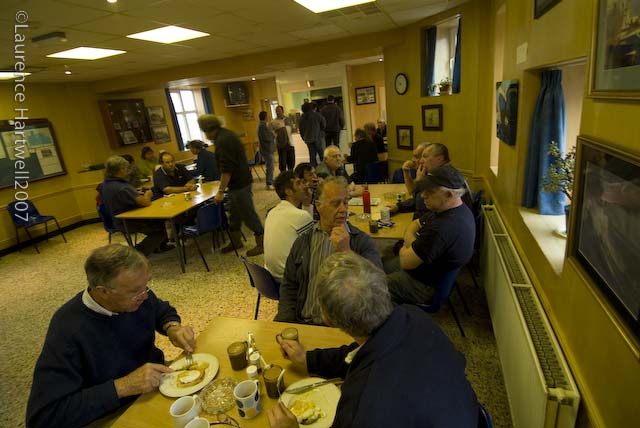 |
| No more grumpy old gits... |
 |
| No more quiet games of Euchre... |
We will no longer have the canteen open on Saturday mornings. 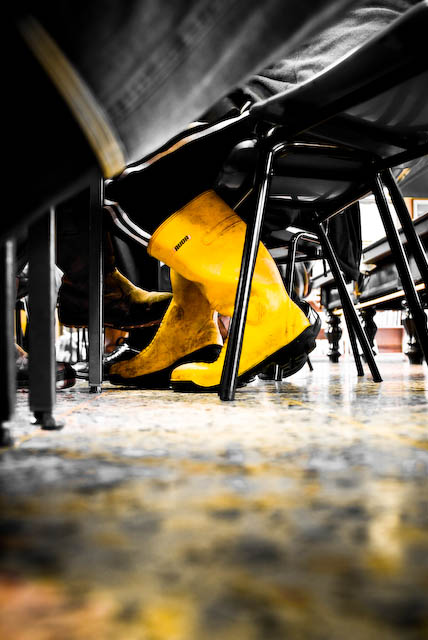 |
| No more refuge for yellow wellies...... |
All of the Missions around the country, that have canteens, are working to this model as well. |
| No more skipper hauled out of bed to cover for poorly Friday night, Saturday morning staff... |
Keith at the Mission control.
PS The Mission will be open of course as usual from Mondays to Fridays serving fine tea, good food and bon hommie!
Tuesday 29 May 2012
Who's got their hands on all our fish?
Baldrick's cunning plan:
In a gradual process bordering on privatisation by stealth, the resource of the many has fallen into the hands of a few.
The Greenpeace campaign calls for a reform of European fishing policy so that it supports low impact, sustainable fishermen.
Greenpeace has spent a lot of time lately on wharves, docks, piers and beaches. The story we're hearing is the same the coast long; the UK's low-impact, small-scale fishing industry is on its last legs. These fishermen, most of whom are part of the inshore under-10-metre fleet, tend to land high quality fish, using methods that do little or no damage to the local environment. But they aren't rewarded. Quite the contrary: despite comprising 77% of the active UK fleet, they have access to only 4% of the country's quota.
So who's got their hands on all our fish? (It's worth remembering they are our indeed our fish; they're a public asset, a common resource). No one really knows who holds UK quota, but what we do know is that the answer mostly involves those with the most economic clout and ability to throw their weight around. In a gradual process bordering on privatisation by stealth, the resource of the many has fallen into the hands of a few.
As the long-time Hastings fisherman John Griffin puts it: "It's definitely the 'greener' side of the industry that's suffering. We're as morally correct as we can be, we don't hide anything and we try to be as green as possible; we're doing our best but we're the ones being pushed out."
Which brings us to an unprecedented alliance between UK fishermen and Greenpeace. Today we're launching a campaign called Be a Fisherman's Friend, to save the UK's struggling inshore fleet, and thereby protect our fish. It's a common myth that Greenpeace is anti- fishing; we just want fishing rights to be given to those who fish in the right way. Most people are aware the system's broken. In fact railing against the EU's Common Fisheries Policy (CFP) is a British political ritual, conducted in language as familiar as the Lord's Prayer or the football results.
So well-worn is this tale that it's rare for anyone to even question its basic veracity, or to ask why, if it's so broken, successive fishing ministers have done so little to fix it? Yet if we cannot find an answer to this question, we will continue to be hamstrung by a policy that's trashing our oceans and failing our fishermen.
A reform of the CFP, currently underway in Brussels, provides a once-in-a decade opportunity to alter things so that the system rewards those fishing sustainably.
But let's go back. How did we get to the point where EU fisheries policy allows a tiny number of high-impact operators to dominate how we manage our oceans and fish stocks, despite their fishing methods being so destructive?
"Efficiencies" in fishing have been progressing at the rate of around 3% a year for decades. Ever-more powerful boats go further and faster, with ruthless and indiscriminate fishing methods, hunting down fish in hundreds of miles of ocean using sophisticated sonar systems.
The inevitable result is that fish stocks decline: 72 % of European fish stocks are now depleted. If we continue to fish as we are, 91% of European fish stocks will be at unsustainable levels within the next decade.
In response to the problem of "over-capacity" [read: too many factory-style boats catching too many fish], boats have had to be forcibly removed from the industry. And because the more "efficient" boats and skippers make the most money, they're often the ones who remain in the game while others are forced to leave. Fishing rights, money and influence have become increasingly concentrated in the hands of a relatively few individuals and businesses, who in turn act as a powerful and entrenched lobby for the kind of industrial scale fishing practices that maximise profit at the expense of local employment and the local environment.
In the UK, this process has been exacerbated by successive governments' chronic mismanagement of the national quota allocation, which is what's left the inshore fleet with access to only 4% of quota. The UK government has also allowed those who control the lion's share of the quota to treat it as a tradable commodity. Unused quota is leased out at exorbitant prices, maximising profits for the quota "owner" at the expense of ordinary fishermen in coastal towns up and down the country. We're on our way to fishing rights being traded like subprime mortgages.
Evidence shows that those who fish selectively and with least environmental impact offer the greatest benefits to the economy. One recent analysis estimated that for every tonne of cod landed, trawlers delivered negative economic value ranging from -£116 for the smallest trawlers to almost -£2,000 for the largest. Gillnets (a lower impact fishing method) in contrast generated a net +£865 of value. Yet between 2006 – 2008, trawlers landed almost 6,000 tonnes of cod, while gillnets landed less than 3% of this – just 163 tonnes.
The CFP reform is an opportunity to sort out the mess. It is now up to the government to pursue reforms at home and in Brussels, which will capture the economic benefits of sustainable fishing. Giving priority access to those who use selective, low-impact methods and provide the highest levels of local employment should become the guiding principle of fisheries management. This won't be easy. Vested interests will continue to claim that "batting for Britain" is simply about grabbing a greater share of the EU pie, rather than securing a truly radical reform of EU and UK fisheries management. For the sake of our fishermen, our fish stocks and the health of our coasts and seas, this government and the fisheries minister, Richard Benyon, must take a different view.
Full story courtesy of the Guardian's environment blog.
In a gradual process bordering on privatisation by stealth, the resource of the many has fallen into the hands of a few.
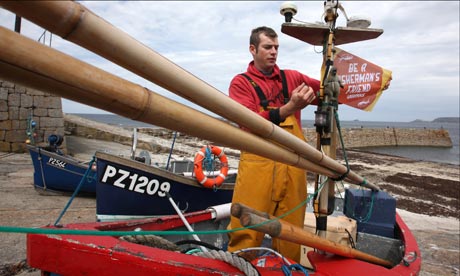 |
| Cornish fishermen Ben George flying the 'Be a Fisherman's Friend' campaign flag.Photograph: David Sandison/Greenpeace |
Greenpeace has spent a lot of time lately on wharves, docks, piers and beaches. The story we're hearing is the same the coast long; the UK's low-impact, small-scale fishing industry is on its last legs. These fishermen, most of whom are part of the inshore under-10-metre fleet, tend to land high quality fish, using methods that do little or no damage to the local environment. But they aren't rewarded. Quite the contrary: despite comprising 77% of the active UK fleet, they have access to only 4% of the country's quota.
So who's got their hands on all our fish? (It's worth remembering they are our indeed our fish; they're a public asset, a common resource). No one really knows who holds UK quota, but what we do know is that the answer mostly involves those with the most economic clout and ability to throw their weight around. In a gradual process bordering on privatisation by stealth, the resource of the many has fallen into the hands of a few.
As the long-time Hastings fisherman John Griffin puts it: "It's definitely the 'greener' side of the industry that's suffering. We're as morally correct as we can be, we don't hide anything and we try to be as green as possible; we're doing our best but we're the ones being pushed out."
Which brings us to an unprecedented alliance between UK fishermen and Greenpeace. Today we're launching a campaign called Be a Fisherman's Friend, to save the UK's struggling inshore fleet, and thereby protect our fish. It's a common myth that Greenpeace is anti- fishing; we just want fishing rights to be given to those who fish in the right way. Most people are aware the system's broken. In fact railing against the EU's Common Fisheries Policy (CFP) is a British political ritual, conducted in language as familiar as the Lord's Prayer or the football results.
So well-worn is this tale that it's rare for anyone to even question its basic veracity, or to ask why, if it's so broken, successive fishing ministers have done so little to fix it? Yet if we cannot find an answer to this question, we will continue to be hamstrung by a policy that's trashing our oceans and failing our fishermen.
A reform of the CFP, currently underway in Brussels, provides a once-in-a decade opportunity to alter things so that the system rewards those fishing sustainably.
But let's go back. How did we get to the point where EU fisheries policy allows a tiny number of high-impact operators to dominate how we manage our oceans and fish stocks, despite their fishing methods being so destructive?
"Efficiencies" in fishing have been progressing at the rate of around 3% a year for decades. Ever-more powerful boats go further and faster, with ruthless and indiscriminate fishing methods, hunting down fish in hundreds of miles of ocean using sophisticated sonar systems.
The inevitable result is that fish stocks decline: 72 % of European fish stocks are now depleted. If we continue to fish as we are, 91% of European fish stocks will be at unsustainable levels within the next decade.
In response to the problem of "over-capacity" [read: too many factory-style boats catching too many fish], boats have had to be forcibly removed from the industry. And because the more "efficient" boats and skippers make the most money, they're often the ones who remain in the game while others are forced to leave. Fishing rights, money and influence have become increasingly concentrated in the hands of a relatively few individuals and businesses, who in turn act as a powerful and entrenched lobby for the kind of industrial scale fishing practices that maximise profit at the expense of local employment and the local environment.
In the UK, this process has been exacerbated by successive governments' chronic mismanagement of the national quota allocation, which is what's left the inshore fleet with access to only 4% of quota. The UK government has also allowed those who control the lion's share of the quota to treat it as a tradable commodity. Unused quota is leased out at exorbitant prices, maximising profits for the quota "owner" at the expense of ordinary fishermen in coastal towns up and down the country. We're on our way to fishing rights being traded like subprime mortgages.
Evidence shows that those who fish selectively and with least environmental impact offer the greatest benefits to the economy. One recent analysis estimated that for every tonne of cod landed, trawlers delivered negative economic value ranging from -£116 for the smallest trawlers to almost -£2,000 for the largest. Gillnets (a lower impact fishing method) in contrast generated a net +£865 of value. Yet between 2006 – 2008, trawlers landed almost 6,000 tonnes of cod, while gillnets landed less than 3% of this – just 163 tonnes.
The CFP reform is an opportunity to sort out the mess. It is now up to the government to pursue reforms at home and in Brussels, which will capture the economic benefits of sustainable fishing. Giving priority access to those who use selective, low-impact methods and provide the highest levels of local employment should become the guiding principle of fisheries management. This won't be easy. Vested interests will continue to claim that "batting for Britain" is simply about grabbing a greater share of the EU pie, rather than securing a truly radical reform of EU and UK fisheries management. For the sake of our fishermen, our fish stocks and the health of our coasts and seas, this government and the fisheries minister, Richard Benyon, must take a different view.
Full story courtesy of the Guardian's environment blog.
Motherships in the abyss
Though this does not directly affect the UK, it does reveal how important the provenance of the catch is with regard to the extent to which the catching and subsequent handling of fish are not transparent. Using tags on fish like Cornish line caught bass and pollock and QR codes like Ajax hake help the food chain maintain standards of transparency.
For Americans, the calculation is worrisome. Thailand is the United States’ second-largest supplier of foreign seafood. Of America's total seafood imports, one out of every six pounds comes from the Southeast Asian nation. The accounts of ex-slaves, Thai fishing syndicates, officials, exporters and anti-trafficking case workers, gathered by GlobalPost in a three-month investigation, illuminate an opaque offshore supply chain enmeshed in slavery.
See the full story here courtesy of the Global Post:
Subscribe to:
Posts (Atom)

